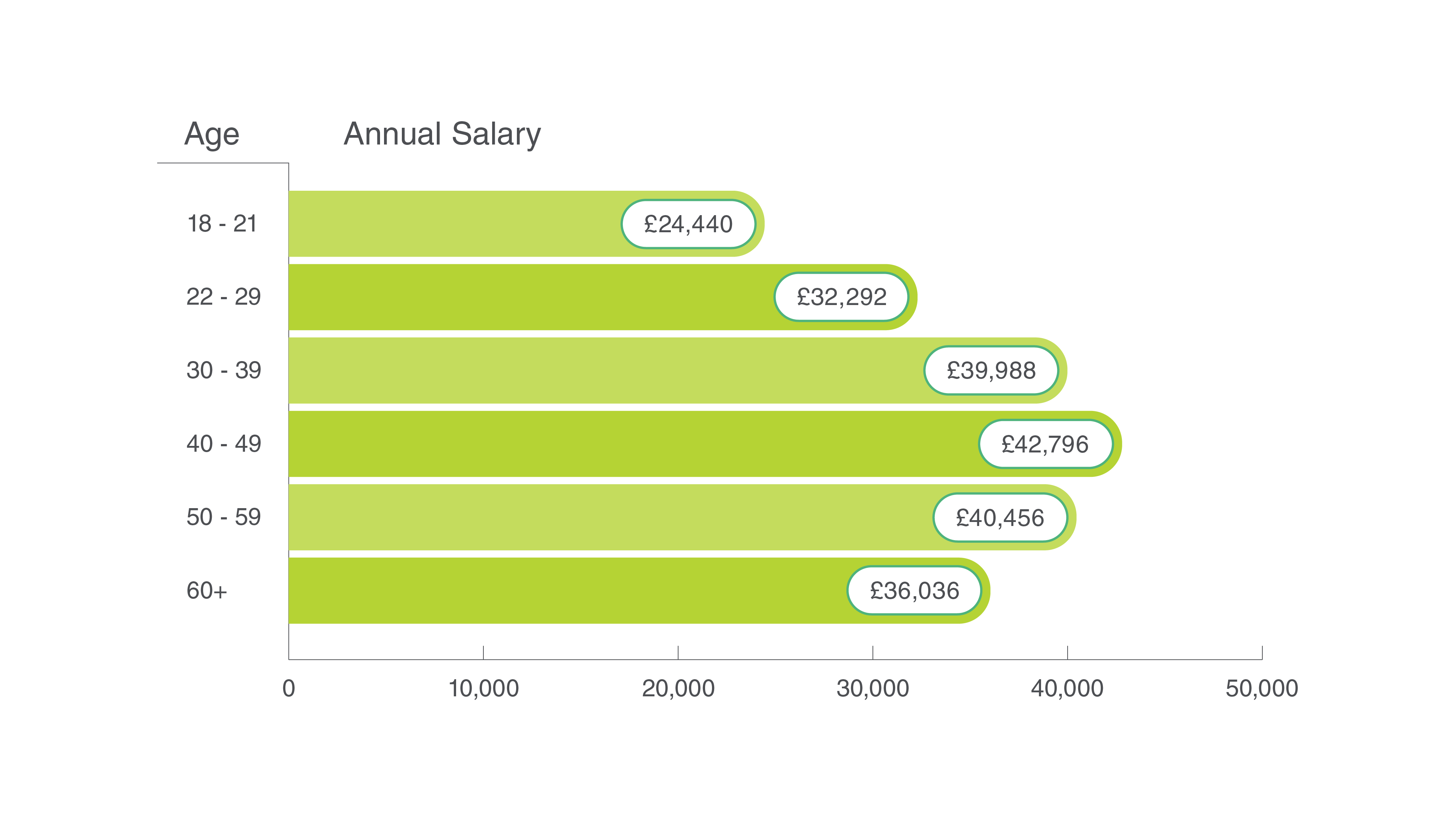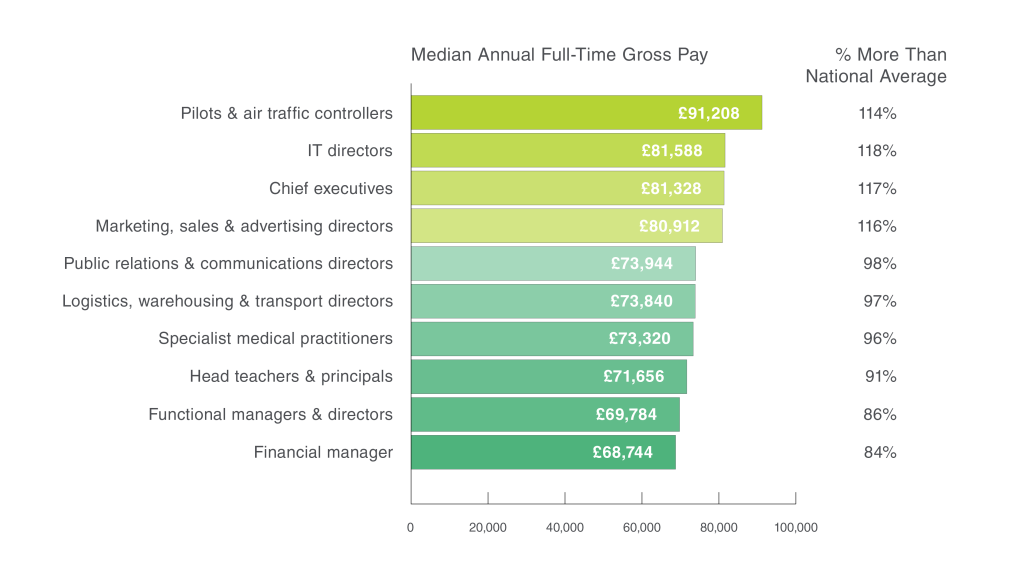Your age isn’t the only number that grows over the years. As you accrue more experience in the workplace, your value to your employers inevitably increases, and that means your salary expectations should follow suit.
There’s a direct correlation between age and salary. For most of your career, the two will grow together as you learn new skills, gain more experience and increase your potential. But your salary also depends on several other variables, including your industry, development, skillset and even gender.
What is the Average Salary in the UK?
What are Brits currently earning on average? Statista reports that the median annual earnings for full-time employees in the United Kingdom were approximately £37,430 in 2024, compared with £34,963 in 2023.
What is the Average Starting Salary in the UK?
What salary can you expect as a new graduate? According to Glassdoor, UK graduates in 2025 can expect a yearly base pay of £23,000 to £43,000 (an average of £31,000).
Of course, the sector you join and the city you live in will influence where your pay falls within this range.
At What Age Does Salary Peak in the UK? Earnings by Age Group in 2025
Recent data from Forbes shows that annual salaries typically reach their peak for workers in the 40 to 49 age group.

| Age | Annual Salary |
| 18–21 | £24,440 |
| 22–29 | £32,292 |
| 30–39 | £39,988 |
| 40–49 | £42,796 |
| 50–59 | £40,456 |
| 60+ | £36,036 |
Other Factors that Influence Your Salary
These factors play a major role in determining how much you should be earning throughout your career.
- Education: It is well known that a degree, at least a suitable qualification from a reputable institution, will positively affect your salary potential. A job hunter with a solid education can expect to come in at the higher end of the starting salary spectrum.
- Experience: This is perhaps the most obvious factor and the one that most closely correlates with your age. The number of years you have spent in a particular role, sector, or industry will significantly impact your salary expectation. This also goes hand-in-hand with anticipated skills development.
- Industry: Salary ranges differ widely across sectors, not only when you’re a graduate but throughout your career. This is based on the skills needed, demands on the employee and level of education required.
- Company: Big, small, traditional, progressive… any number of attributes will influence how much a company pays their employees.
- Location: The region you live in will also affect your salary, due to factors like productivity and GDP per head in your area.
- Gender: Women currently earn less than men for full-time work across all age groups.
How Does Gender Affect Salary in the UK?
The gender pay gap is especially noticeable among full-time employees aged between 30 and 59. Data from Forbes shows the following pay differences by gender:
| Age | Men Annual Gross Pay | Women’s Annual Gross Pay |
| 18–21 | £24,960 | £24,440 |
| 22–29 | £33,176 | £32,292 |
| 30–39 | £41,652 | £39,988 |
| 40–49 | £45,552 | £42,796 |
| 50–59 | £43,940 | £40,456 |
| 60+ | £38,636 | £36,036 |
While the gender gap in full-time positions remains a constant issue, women in part-time positions are out-earning their male counterparts. The Office for National Statistics (ONS) reports that:
Median hourly pay for full-time employees was 7% less for women than for men in April 2024.
Median hourly pay for part-time employees was 3% higher for women than for men.
(Note: These figures exclude overtime pay.)
Average Salary in London vs the Rest of the UK
Annual earnings across the country vary significantly by region. Average median pay ranges from the highest in London (£47,455) to the lowest in the North East (£32,960). South East England and Scotland are both above the UK average, at £39,038 and £38,315 respectively.
What is the Average UK Salary by Industry?
Salary by industry varies widely in the UK:
- As of 2023, those working full-time in electricity, gas, steam and air conditioning supply earned the highest on average, at £955 a week.
- Meanwhile, those in accommodation and food services earned just £505 a week, the lowest average earnings for that year.
What are the Highest-Paying Jobs in the UK?
Forbes lists the following as the country’s top-earning jobs:

| Occupation | Median Annual Full-Time Gross Pay | % More Than National Average |
| Pilots & air traffic controllers | £91,208 | 144% |
| IT directors | £81,588 | 118% |
| Chief executives | £81,328 | 117% |
| Marketing, sales & advertising directors | £80,912 | 116% |
| Public relations & communications directors | £73,944 | 98% |
| Logistics, warehousing & transport directors | £73,840 | 97% |
| Specialist medical practitioners | £73,320 | 96% |
| Head teachers & principals | £71,656 | 91% |
| Functional managers & directors | £69,784 | 86% |
| Financial manager | £68,744 | 84% |
Ten Fastest-Growing UK Industries
These UK industries are set to be the biggest by revenue in 2026, indicating the possibility of better job opportunities and earnings in the future.
| Industry | Revenue for 2026 |
| Supermarkets | £192.1B |
| Construction contractors | £180.3B |
| New car & light motor vehicle dealers | £146.6B |
| Banks | £128.6B |
| Pension funding | £119.7B |
| Hospitals | £115.1B |
| Residential Building Construction | £97.4B |
| Computer consultants | £91.9B |
| General insurance | £81.7B |
| Management consultants | £79.0B |
What Employees Want: Does More Pay Equal Higher Satisfaction?
While earning a good wage plays an essential role in overall job satisfaction, it’s not the only factor that keeps employees loyal.
Key findings from the 2025 “What Workers Want” survey revealed that flexibility is a top priority. 59% of employees without flexible work options are planning to leave within the next 12 months (compared to 50% in 2024).
In terms of age groups, 46% of employees aged 35–44 are likely to be looking for new jobs, motivated by pay dissatisfaction and heavy workloads.
Most employees view a 7% pay rise in 2025 as ‘fair’ (down from 8% in 2024), with workers in the hospitality, retail and healthcare industries wanting the highest increases.
Industries with the highest employee satisfaction levels are engineering, manufacturing and charities. Meanwhile, healthcare, retail, transport and logistics are least satisfied.
The survey also found that employees value these factors the most:
- Flexible hours (75%)
- Remote work (62%)
- Extra holiday time (48%)
And it doesn’t stop at flexible working. According to the World Economic Forum, these are four key things employees want from their jobs in 2025:
- Inclusion in decision-making
- Trust, autonomy and flexibility
- More confidence in reskilling
- Focus on protecting their employability
How Does Office Space Contribute to Happiness at Work?
There is a definite link between employee satisfaction and the type of space we work in.
Some researchers say open-plan offices promote lower stress levels, while others say commercial property integrated with tech can improve productivity and free up time for more creativity. Ultimately, it’s all about striking a balance and offering flexibility – a top priority for employees.
When considering where to work, look for companies that offer remote or hybrid working, the opportunity to collaborate in coworking spaces, a strong culture and a focus on work-life balance. Employers who typically focus on employee well-being and employability protection as priorities are more likely to attract and retain the best talent.
Find your perfect flexible office: 10 of the best coworking spaces in London.
How to Increase Your Salary in the UK
Whether you’re in the highest or lowest-paying industries, and whatever your age may be, there’s always room to grow. Your salary and potential earnings will increase as you improve your skills, knowledge and experience, but there are a few ways you can increase it right now:
1. Negotiate a salary raise
Keep details of your achievements at work and use them as leverage when negotiating a salary increase.
2. Research and compare your salary
Know how much your skills are worth and compare your salary with the industry average for an overview.
3. Become an expert
Consider training or studying short courses to become more knowledgeable in your industry.
The moral of the story? Keep improving your worth, learning from great mentors and studying your niche to fund success in your industry through every stage of your career.
Are you confused by office rental terms or want to brush up on your office jargon? We’ve created a useful Glossary of Flexible Office Space Terms, whether it’s hybrid, hotdesking or flexi working, you’ll find all the explanations you need.
Looking for Office Space?
We Operate in Some of the World’s Top Cities:
London, New York, San Francisco, Paris, Singapore, Hong Kong, Search more locations

Lmao at these highest paid jobs. Investment bankers earn GBP 80,000-200,000 with bonus at their 20’s.
These encompass a very small minority of the working population (in case you hadn’t noticed….) in a very unstable environment that is often not particularly stimulating or interesting once people realise what’s involved – office based, long hours, and a dull-ish spread-sheet driven work pattern. It also has a fairly poor reputation. Money is absolutely not the key to a good life….
I’m afraid money is the key to a good life generally speaking maybe not happiness
In terms of scientific work…….The UK is dying…its a dead empire….much better wage prospects in other parts of Europe
30 years old with 2 patents to my name….many high skilled jobs…..and yet still struggling to get even 20k per year…..UK is awful for science jobs in certain areas…..what a mess……too often we blame individuals ..but Ive worked damned-ably hard……get out of the UK is good advice for some
Where do you work? I’m just 30, have a patent to my name and a highly skilled job in engineering. My yearly take-home (before tax) is well over three times that you’re suggesting.
Quite agree with Garin’s suggestion to avoid the public sector. I’m a Chartered professional and I have a Leadership qualification. I work in the NHS, where I’ve worked in the same hospital trust for 23 years and earn about £8k a year less than is suggested above.
You should have left after the first few years of a stagnant salary. It’s entirely your fault for not moving and then using that job offer to either negotiate a better salary or earn a better salary elsewhere.
The public sector in one respect, is just like the private sector. It will pay as little as possible until it is forced to pay higher.
Are you in a bit of a bubble AK. One cannot negotiate pay in the public sector, it is take it or leave it. I suspect, unlike your profession which probably has vacancies in the same area, some types of job, usually requires a long distance move to another part of the UK. When you have a home, commitments, family considerations, etc, not always possible. I know public sector employees, where the other half (wife, husband, life partner etc) is the bread winner, so a geographical move is out of the question. Yes, I have been offered a much, much better salary elsewhere, but not in the right part of the country. One of my public sector colleagues from that part of the country, took the job offer after my onward referral, and doubled his salary. One could argue the public sector is being forced to pay more, but is refusing to, it really does have a retention and recruitment problem, such as over 30,000 nurse vacancies and more leaving than joining. Public sector forestry, my profession, often has to advertise vacancies several times to get suitable applicants, (e.g. the recent advert for two vacancies for forest planners in Huntly), that says there is a salary problem. However, the Treasury is refusing to allow the individual departments to pay the market rate. Result, the individual departments drop the qualification and experience requirements just to fill vacancies, making it look like there are no problems. The same market rules should apply to both private and public sector, but unlike the private sector, the public sector is limited to no more than 1% increase on salaries budget. I stand by what I said, if you can move from the public sector to private, do it.
“It’s entirely your fault for not moving” …. oh cut him some slack….you act as if humans are PERFECT robots with full knowledge………get a grip …. people need help and guidance…not shaming
how long has that problem been in your life is it poverty, no more jobs, you have not been upgraded at your place of work or your husband is not loving you anymore, a fruit of the womb, you need gambling powers call me on +2349062323996 or email me on [email protected] and get all of your problems solved in less than 3 nights if you are ready for a change of situation.
Avoid the public sector, and forestry, after 30 yrs, degree qualified, my basic is still only £25k/yr, and the Tory chancellor philip Hammond reckons I’m overpaid!
You should have left after the first few years of a stagnant salary. It’s entirely your fault for not moving and then using that job offer to either negotiate a better salary or earn a better salary elsewhere.
AK, see my reply above. If you have ever had to up sticks and move to another part of the UK, such as Northern Ireland, or SW Scotland, let me know. The public sector will not negotiate salary. You will see not always so easy, especially with commitments. I’m now in a position to move geographically, probably will. I stand by what I say, avoid the public sector, pay, reward, recognition etc is not great for professional grades. Having spent half my career in the private sector, I am under no illusions.
the UK is a mess….its profit greedy and doesnt give a damn for the once vibrant and beautifully diverse communities here